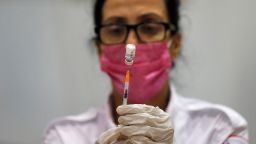Editor’s Note: Richard E. Besser, a physician, is president and chief executive officer of the Robert Wood Johnson Foundation and former acting director of the Centers for Disease Control and Prevention. He tweets @DrRichBesser. The views expressed in this commentary are his own. Read more opinion articles on CNN.
Over the past few weeks, people across the country have experienced the frustrations of demand for Covid-19 tests far exceeding supply. I can relate. After my son experienced a breakthrough Covid-19 case over the holidays, my wife and I scoured our area for at-home rapid antigen tests and PCR test appointments. Neither was available at local pharmacies. We managed to secure testing appointments at our local YMCA, only to have them canceled due to lack of staffing. We then got in a line at a state-run testing site in a sports arena. Two-and-a-half hours later we had our tests, and three days later my wife and I had our results, which came back negative.

Despite such a time-consuming hassle, we were, in many ways, fortunate. I could stand in line for hours because I have paid time off from work. I could endure a three-day wait for results because I can work safely from home. My son, who has thankfully recovered, could have easily received care from a physician because he has health insurance. We have the peace of mind that comes with things like access to health care, paid leave and remote work. But millions of Americans do not.
The current testing environment – combined with the astonishingly rapid ascent of the Omicron variant – is once again exposing a much larger problem of health equity. Almost two years into this crisis, the ability to protect yourself and your family is still heavily influenced by such factors as skin color and income level. We should no longer permit these inequities to persist.
The early evidence that Omicron may cause less severe illness than some other variants is a relief, and many vaccinated people will likely be spared from hospitalization even if they experience breakthrough cases. But, on a societal level, Omicron is wreaking a unique and alarming brand of havoc. The sheer volume of cases in such a short time is filling hospitals to capacity. Heroic health care workers are being stretched to, if not beyond, their breaking points. School and child care disruptions have returned amid an ongoing youth mental health crisis. The burdens on working parents and caregivers are growing even heavier.
Various federal relief bills over the past two years have helped people weather the storm; poverty rates have even declined as a result. But many of the most effective provisions in those laws – from the expanded Child Tax Credit (which helped people purchase food, clothes and other essentials) to the federal eviction moratorium (which helped people stay in their homes even if they fell behind on rent) – have ended. Other forms of assistance have not yet reached their intended targets, including many of the federal dollars appropriated for rent relief. The Build Back Better Act includes a number of provisions that would help families get through this next stretch, including a continuation of the expanded Child Tax Credit, a national paid leave program and additional child care support. But its prospects for passage have dimmed significantly.
The consequences of our continued failure to address the major gaps in America’s social safety net are illustrated by the focus in recent days on the US Centers for Disease Control and Prevention’s decision to shorten the number of days an infected person should remain in isolation, and the subsequent debate over whether a negative rapid antigen test result should be required for an asymptomatic individual to come out of isolation.
While we should continue to follow the science as it evolves on that front, the broader issue is that isolation periods of any length remain untenable for millions of people. Studies over the course of the pandemic have shown that limited numbers of people are able to commit fully to isolation protocols, in part due to financial difficulties faced by those with lower wages. According to the Department of Labor, 65% of lower-wage workers lack any paid sick leave whatsoever, which continues to put them in an impossible bind: Go to work and risk infecting scores of other people, or stay home and risk losing income or even a job. The burdens of securing tests at this point in time still fall hardest on people disproportionately affected by the pandemic, including those paid low wages (who are often least likely to have paid time off of work) and people of color (who are more likely to live in neighborhoods with fewer health care resources, which may imperil access to Covid-19 tests).
There are hopeful signs that the Omicron wave may not last long; our situation could look much better in a month or two. But how many more lives will be lost before we reach the other side?
Our response to this moment must rise to the immense challenges it presents. The Biden administration has promised 500 million free at-home rapid tests and more free test kits distributed via community clinics, and is requiring health insurance companies to cover the cost of at-home tests purchased by the insured. The increase in testing supply is welcome but should be considered just a start; 500 million tests average out to less than two tests per person. And the insurance provision is being structured as a reimbursable expense rather than a waived cost; the latter would be far less cumbersome and not force people who might not have spare cash to pay upfront. We must use every lever at our disposal to quickly and dramatically expand our free testing supply.
Other steps are necessary. Ensuring health insurance for every American, providing a living wage and paid leave for all workers, and securing affordable child care for every family may sound like long-term aspirations, but Omicron is a blunt reminder that they must become immediate policy priorities. Schools need resources to implement test-to-stay protocols to keep children in classrooms, and if they are forced to return to virtual instruction, ensure that all children have computers and home internet access. Regardless of whether it is required by law, businesses should provide all employees paid time off for illness or to care for a loved one; it’s the right thing to do. And people not yet vaccinated should seriously reconsider that risky decision.
Public health recommendations represent the best scientific advice we have, but they are only words on paper unless we can act on them. If we want people to test, we must provide tests. If we want people to stay isolated, even for shorter periods of time, we must ensure that they will not lose their livelihoods or be unable to pay their bills as a result. The public health playbook remains our ticket out of this crisis, but only if we finally give all people the resources to follow it.





